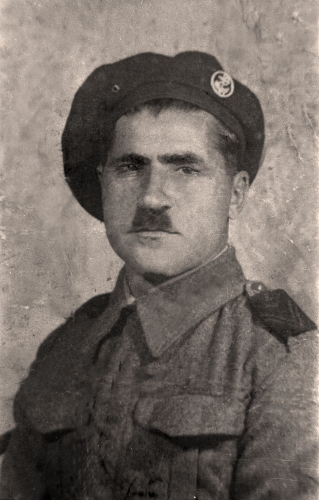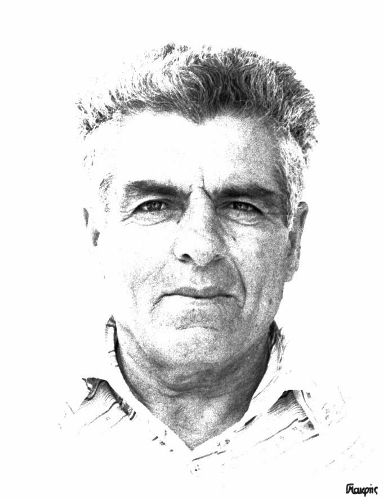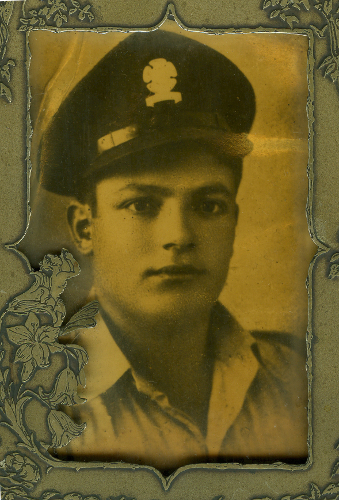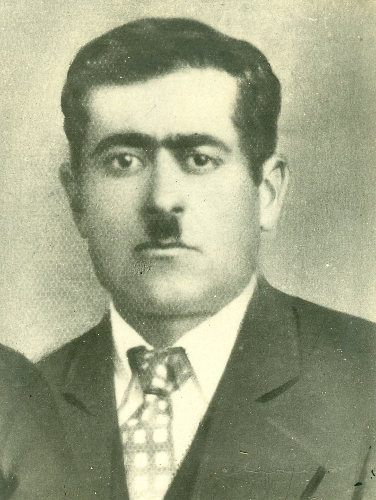Escape to Asia Minor
Background to the stories by Manolis Makris
 In early 1944, a man from Volada called Christoforos Litos and a man from Samos and an Italian were concealed in a cave at Vananda with a transmitter, acting as spies. They were supplied, when possible, with food and water by the locals, a very dangerous undertaking. The Germans became suspicious and, at one point, a German soldier actually stood above the cave without being aware of it.
In early 1944, a man from Volada called Christoforos Litos and a man from Samos and an Italian were concealed in a cave at Vananda with a transmitter, acting as spies. They were supplied, when possible, with food and water by the locals, a very dangerous undertaking. The Germans became suspicious and, at one point, a German soldier actually stood above the cave without being aware of it.
The plan of the Germans was to form a group to combat the spies and to know their names and those of any helper. So, an agonising decision was made by four daring local men that the danger had become too great and they would sail via Tilos to Asia Minor. Nothing from what happened in the war has been so much discussed as the subsequent events. It has become almost legendary. We hear among the people many slightly different versions but the witness of the people who played the main roles gives us an original, and doubtless correct, account of these terrible events told in a simple and dramatic fashion with no one portrayed as a hero.
Note: For the record the four men were Manolis Karellas, his son Vassilis Karellas, Manolis Orfanos and Nikias Hartofylakas.
Story told by Nikias Hartofylakas

From Alimounda the boat of the men seeking out spies came to Steno note. There it went around Steno once and then anchored in Halavronda. People from Olympos came and told me that they saw a boat on the west side of the island that went to Evgonymos. It seemed to me strange that a boat of the spy catchers appears in this way below Olympos. I decided to go to Saria and see what was happening.
I went and found the Brigadiere in Diafani and told him that I wanted to go to Saria to bring two barrels of gasoline. He gave me permission. I took with me my son Nikolis in the boat and I went to Saria.
I went straight to Halavronda. When we reached there I saw seventeen people on the beach, all naked. Nikolis rowed and I pretended to be fishing. We got to the end of the beach and I greeted them from a distance with my hand. Two of them put on shorts and approached. One of them spoke to me in Greek, he was a teacher.
“Hello.”
“Greetings” I said.
“Of course, you will be Nikias Hartofylakas.”
“How do you know me?”
“We have information and we know you.”
I said to them “Are you the people who were in Alimounda?”
“Yes, we are. We are waiting for some of our allies’ boats. English boats to come”.
We talked for some time. We spoke about many things. I did not deny that I had relations with the spies but even if I’d not said that, they knew. They didn’t ask me about the weapons (pistols and rifles were hidden near Palatia) and I understood that they did not know about them and this made me suspicious. As we were talking with the teacher someone was writing. I did not understand what he was writing but looking out of the corner of my eye I recognised that he was writing Italian. I think he was writing a report. I remember that he was writing oggi (which is today in Italian). They gave me cigarettes. I looked at the cigarettes and they were from Rodos. Nikolis was there beside me. They gave us two army plates with macaroni. The army plates were Italian. I started to be suspicious that they had to do with the Germans. Anyway, we ate. I kept cool. I was saying to myself first let’s leave then I’ll work out what to do.
I said to them “Guys. I have to go. I have permission from the Finanza in Diafani and I can’t stay. I go from Steno to fish also a little and if I see boats I will inform you.”
“Go!” they told me.
I bade them farewell. Nikolis brought the boat closer and put a glass note in the water and we started. As we were passing from the middle of the bay I could see through the glass empty Italian cans thrown in the water. As we were going I was thinking that I had no chance to survive other than leave that evening by boat. On the island, anywhere I hid they would find me. Only if I could leave my boat and go to the east (Turkey) I would survive. We passed the cape and went to Yaplo and I found there two people from Olympos. They came down to Yaplo from Pila and they saw me and whistled. I stopped and waited for them.
“Can you take us to Diafani?”
“Of course.”
They got in the boat, we put up the sail and set off. I did not tell them anything either about the danger I was in or the plan I had to leave.
Story told by Vassilis E Karellas

We left at 9 o’clock in the evening. We crossed ourselves as we left the cape which was at the northern point of Saria and sailed to the open sea. Me and Manolis Orfanos rowed. Then we also put up a sail. Nikias had two sails in the boat, an old one and a new one. When it was windy we could put up a small sail and when it was calm a big one. Fortunately, it was a calm sea for the whole trip! We headed for Tilos where we would hide in the daytime and proceed from there to Turkey.
We rowed all night and at dawn we were six to seven miles west of Tilos. We had four oars and we were all rowing. We put up the sail when the weather was good so we made good progress. But when I think of that time I remember my agony thinking the island was still too far.
There is an island close to Tilos called Askina. There we could stay hidden all day long and continue the next night to Turkey. Our fear was that a boat or plane might appear and hit us. Indeed, a plane did appear but it was English. At this time, the allies were bombing Rhodes. So, we were getting closer and closer to Askina with the sails down so that we were less visible. It was first light, 7th May 1944. We went close to Askina intending to land, sink the boat and hide until evening. But we had good luck; we found a cave directly in front of the bow of the boat where the water was deep enough for us to go in. There was a way out above and we went up and found it was a desert island full of gulls and you could see Karpathos in one direction very clearly. It was 8 am.
We stayed up there. The day seemed to last ten years. None of us could eat because of the distress and tension. We waited for dark and set sail again. We drank only water. We could see Tilos and Simi. About Simi, we were not sure if the Germans or the English held the island as it seemed to change almost from day to day.
Story told by Nikias Hartofylakas
The boat was good and sailed well. I had bought it from Minas Balaskas. We were rowing and sailing all night and at dawn we got close to Tilos and we turned to a small desert island of which Captain Stelios had told me. We stayed there all day long. One moment we saw a German speed boat coming straight in our direction. I had taken with me dynamite. I put ten sticks together to make a bomb. I had it in my hand and had it ready. If the boat came near I would light the fuse and throw it into the boat which meant that we would all be destroyed. Fortunately, the boat passed one hundred metres away and they did not see us.
Story told by Vasilis E Karellas
After dark, at 9 o’clock, we went to the boat. We raised the sail and left. We had the big sail, the white one. The weather was good and we estimated that such a short distance would pass quickly.
But as we were sailing, sure of success, from two places in Symi search lights of machine gun positions swept the sea, the beams crossing. We thought that we are without hope and where should we go? One said to go from the side of Symi in the direction of Karpathos and to go to Alopos. Another said we should go closer to Symi. We decided to put down the sail to be less visible and to row but finally we did not put down the sail because it was pulling so well. In the end the machine gunners did not see us because they were searching Greek waters and not Turkish waters. We were in the middle, we passed the place and finally reached Turkey.

The sea was calm but the current was very strong. The land was right there in front of us and higher up we could see some lights. It was an island but we didn’t know that. We said to go and anchor there but Nikias said there was danger in going there because the Turks would not know who we were and might shoot and kill us. Just after, we avoided the Germans! Especially the oldest of us, Nikias, and my father were afraid of the lights that we could see and said surely, they are from Turkish army guards. It was about 3 am so we decided to wait until daylight. Nikias said let the young ones look after the boat and we will sleep. We did not even leave the oars in the water but rested our heads on them, me and Manolis, and as we were also very tired we all slept. The older ones were asleep already and the current almost took us back to Tilos and when we woke up it was already day.
We started rowing again but it was not possible to cover so many miles. We kept rowing and rowing, always with the fear that a German plane might see us and come from Rodos and in that case we could do nothing. But in case an enemy boat would approach Nikias had ready the dynamite which we kept in the stern of the boat. We had all of us decided if necessary to burn with the Germans.
The current took us close to Kos. I remember it like it was yesterday, the sun rising over the mountains in the east. Still rowing we got close to Tilos again. And then we suddenly heard engine noise. It was a German airplane. It came and swooped towards us and shot over our heads. I think it was intended for us and we all said “Now we are finished”. At the same moment, we heard another engine noise. It was an English airplane coming from Turkey and hitting the German. Then another German airplane appeared coming from the Dodecanese and another English one from Turkey. One of the German airplanes was on fire. Surely it was hit and it fell into the sea. We all rowed with the strength we still had and as this dog fight went on we found our chance and reached Turkey.
Story told by Michalis E Papavassilis

Two or three months passed from the time the four men escaped to Asia Minor. All the people here thought that they were drowned and their families were crying. During this time, we brought supplies from Pigadia in local rowing boats; the Italians called this spenza note. This also happened at the time of the Germans and continued into the time of the English.
One day when we were working in Pigadia and were unloading the boats when a boat arrived called Korytsa. A Greek man came up onto the bridge and asked us ‘Guys! Where you from?’ We said ‘Olympos!’ He said ‘Did you know Manolis Orfanos, Vassilis Karellas, Manolis Karellas and Nikias Hartofylakas?’ You can imagine our joy! We said ‘Come down!’. The man came and told us that the men had landed in Egypt after having arrived in good health in Asia Minor. He gave us a letter. ‘You will take it and give it to the mother of Manolis Orfanos but don’t open it.’
When we were alone we could not control our anxiety and we opened the letter. The writer had put a photograph of himself in the letter and had written to his mother saying he was OK.
The same evening we returned to Diafani and I went to Olympos. In Platy there were many people, I don’t know why - Yannis Paleos, Michalis Zervos and others. I called them and told them that the men who'd escaped to Asia Minor had not died fishing but had arrived in the Middle East alive and well! We also gave the letter to Manolis' mother because she thought he was dead. We also informed the families of the others that we had news that they were alive.
Story told by Nikias Hartofylakas
After we left Egypt and got to Piraeus in 1945, I had my discharge papers after 16 months in the navy. The war had finished and I did not want to stay in the forces and be involved in the civil war. I found many people in Piraeus from Karpathos who wanted to go home! Men and women. We found a caïque and 52 people came directly to Karpathos. We landed here in Diafani and just after I arrived I butchered a lamb and I remember all the people who had travelled ate and drank well. And the memory makes me weep (At this moment Nikias started to weep.)
I got from the English 100 pounds, from the Australians another 100 and from Greece 300,000 drachmas, which was all good money at the time.